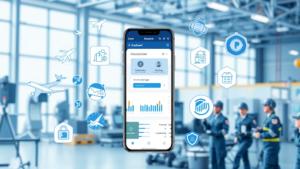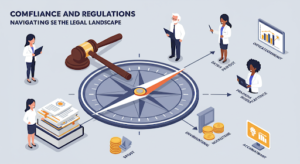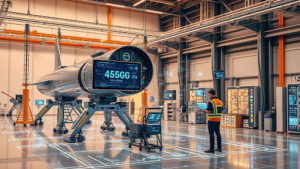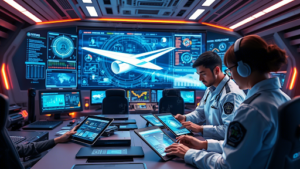In an era where technology plays a pivotal role in national security, aerospace and defense organizations must integrate advanced digital solutions into their operations. Mobile app development services are increasingly crucial in this sector, offering real-time intelligence, enhanced communication, and streamlined mission planning. However, these applications must meet the highest security standards to prevent cyber threats and ensure seamless functionality in critical scenarios.
The aerospace and defense industry demands mobile apps that are not only sophisticated but also highly secure and reliable. With evolving threats and stringent compliance requirements, developing applications for this sector requires expertise, precision, and adherence to best practices in cybersecurity. In this article, we explore the key aspects of mobile app development for aerospace and defense operations, highlighting security considerations, essential features, and industry trends.
The Unique Challenges of Mobile App Development for Aerospace & Defense

Unlike traditional commercial applications, mobile apps designed for aerospace and defense face unique challenges that demand specialized development approaches. One major challenge is the high level of security required to protect sensitive data from cyber threats and unauthorized access.
Additionally, these applications must function seamlessly in remote or high-risk environments where internet connectivity may be limited or entirely unavailable. Developers must ensure that apps operate efficiently in offline modes and synchronize data securely when reconnected to the network. These challenges necessitate a robust mobile app development strategy tailored to the unique demands of aerospace and defense.
Safeguarding Mobile Apps Against Cyber Threats

Security is paramount in aerospace and defense mobile app development. Cyberattacks targeting defense systems can lead to catastrophic consequences, making it essential to integrate multiple layers of security into mobile applications.
To achieve this, developers must implement end-to-end encryption, biometric authentication, multi-factor authentication (MFA), and blockchain technology for data integrity. Additionally, rigorous penetration testing and security audits should be conducted regularly to identify and mitigate vulnerabilities. Mobile app development services specializing in this sector must prioritize security-first methodologies to ensure the highest level of protection.
Essential Features of Mobile Apps for Aerospace & Defense

Aerospace and defense mobile applications must incorporate advanced features to enhance operational efficiency and security. One essential feature is real-time data transmission, enabling commanders and personnel to make informed decisions based on live intelligence feeds.
Additionally, mobile apps should include AI-powered predictive analytics, geofencing for location tracking, secure cloud storage, and AR/VR capabilities for training simulations. By integrating these cutting-edge features, mobile app development services can provide aerospace and defense organizations with tools that enhance strategic planning and mission execution.
The Role of AI and Machine Learning in Aerospace & Defense Mobile Apps

Artificial Intelligence (AI) and Machine Learning (ML) are revolutionizing mobile app development in aerospace and defense. These technologies enable predictive maintenance, automate threat detection, and optimize decision-making processes.
AI-powered chatbots can assist personnel with real-time information retrieval, while machine learning algorithms analyze vast datasets to identify patterns and predict potential security threats. By leveraging AI and ML, aerospace and defense mobile applications become more intelligent, adaptive, and capable of handling complex scenarios.
Compliance and Regulations

Aerospace and defense mobile apps must adhere to strict regulatory frameworks to ensure compliance with national and international security standards. Developers must follow guidelines set by organizations such as the National Institute of Standards and Technology (NIST), the General Data Protection Regulation (GDPR), and the International Traffic in Arms Regulations (ITAR).
Ensuring compliance requires thorough documentation, data encryption, and secure access control mechanisms. Mobile app development services catering to the aerospace and defense sector must have in-depth knowledge of these regulations to develop apps that meet legal and security requirements.
The Impact of 5G and Edge Computing on Aerospace & Defense Mobile Apps

The impact of 5G technology and edge computing is transforming mobile app development for aerospace and defense. 5G networks provide ultra-fast, low-latency communication, enabling real-time data exchange between devices and defense systems.
Edge computing enhances processing efficiency by handling data closer to the source, reducing the reliance on centralized cloud servers. This is particularly beneficial for defense operations, where real-time decision-making is critical. By incorporating 5G and edge computing, mobile app development services can enhance the speed, reliability, and security of aerospace and defense applications.
Future Trends in Mobile App Development for Aerospace & Defense

The future of mobile app development in aerospace and defense will be driven by advancements in cybersecurity, AI, and quantum computing. Quantum encryption is expected to provide unbreakable security for sensitive defense communications, while AI-driven automation will streamline mission planning and execution.
Moreover, the integration of augmented reality (AR) and virtual reality (VR) will enhance training simulations, allowing defense personnel to prepare for real-world scenarios in a risk-free environment. Staying ahead of these trends will be essential for mobile app development services looking to innovate in the aerospace and defense sector.
Conclusion
Developing mobile applications for aerospace and defense is a complex yet essential task that requires a focus on security, compliance, and cutting-edge technology. By integrating AI, ML, 5G, and blockchain security, developers can create powerful applications that enhance operational efficiency and protect sensitive data from cyber threats.
Mobile app development services specializing in this sector must remain agile, adapting to emerging threats and technological advancements. As the aerospace and defense industry continues to evolve, secure mobile applications will play a pivotal role in ensuring national security and mission success.
